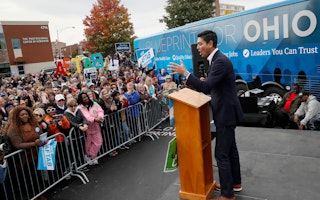A Better Way to Govern
By Hollie Russon Gilman

In 2020, the pandemic, racial justice crisis, and presidential election created an unprecedented mass mobilization of Americans. Neighborhood-level organizing cropped up across the country, with people sewing masks and supporting high-risk neighbors. In possibly the largest movement in American history, 15–26 million people protested the murder of George Floyd. The Defund the Police movement sparked a focus on hyperlocal organizing, specifically around municipal budgets. Finally, the 2020 election saw a spike in voter turnout. These efforts all represented a dramatic increase in civic power and engagement.
Elected officials responded with more participatory styles of governance. The Biden-Harris administration issued several executive orders on racial equity and modernizing regulations and rulemaking that recognize the importance of public participation. At the local level, cities enacted new programs to incentivize public participation. For example, Miami introduced new methods of online public participation via voice message, text, or video, in addition to hosting virtual commission meetings.
The movements of 2020 created a unique urgency to radically transform American democracy. However, translating this energy into long-term change will require structural adjustments beyond these initial crisis response measures. Building civic power will require designing local, state, and federal government through a participatory and equitable lens, one that channels people’s energy into concrete power-sharing.
One way to achieve this is through collaborative governance, or co-governance—a democratic process through which residents and the government share in decision-making power to achieve common goals. Co-governance is not a static state, but rather a mode of interactive decision-making that allows for ongoing relationships and responds to shifts in the political and policy environment. A number of jurisdictions have been experimenting with co-governance, bringing to light three key takeaways:
1. To translate this principle into real pathways for community agency requires research into best practices and funding to replicate models that work.
Brookline, Massachusetts’ Task Force to Reimagine Policing emerged from last year’s protests for racial justice. The Task Force carried out months of research, interviews, and discussion on the impact of policing on specific populations, especially Black, Indigenous, and people of color communities. The Task Force held public hearings and conducted a survey which received over 1,300 respondents and was weighted to be demographically representative of Brookline. The findings highlighted the need to invest in alternative ways to support community mental health and safety and had tangible results, including the removal of school resource officers and an end to Brookline’s Walk and Talk program, a public housing policing initiative.
Co-governance should aim to give real power to the people through voting and inclusive decision-making; seek input from those most impacted by the policy, who are often sidelined; and foster productive relationships between residents and elected officials.
2. Co-governance requires flexibility, incremental change, and patience; outcomes may only become visible after years of effort.
The nationwide Child Tax Credit program that began this summer came after decades of advocacy. Organizing to expand the tax credit amount and eliminate the work requirement began in 2001 and, at first, some of the wins were incremental. However, as Deepak Bhargava and Dorian T. Warren wrote about their advocacy with Community Change, “it took 20 years of organizing, but the fringe is now mainstream.” The program may now become a “political multiplier,” with millions of impacted Americans potentially mobilizing and using their civic power to advocate for a permanent program.
Co-governance offers an opportunity to create positive feedback loops which encourage and foster genuine respect and a shared understanding of power between government and civil society. By design, these models should be iterative and open to change.
3. Co-governance can help facilitate better relationships between different sectors of democracy.
When voters in Colorado passed a ballot measure to create statewide paid leave in 2020, it was the result of years of collaborative organizing across many different groups of democratic actors. After years of failed legislative attempts to pass paid leave, advocates turned to a ballot measure. The road to getting Proposition 118 passed featured a combination of political stakeholders, compromises, re-strategization, and outreach to the public.
“Colorado is at the vanguard of supporting working families . . . and at the same time we have faced an uphill battle, often facing hundreds of lobbyists,” said Jessie Ulibarri, a former Colorado state senator who had been pushing for the bill for six years before taking office. Co-governance was helpful in this effort. According to Wendy Howell, deputy director of the Colorado Working Families Party, turning to the people “would just make sense if you have those dynamics where you’re struggling with your legislature but [the proposal is] hugely popular.”
In each of these cases, co-governance helped officials and constituents work together towards solving immediate problems. But ultimately, the goal is to use the current moment to build long-term capacity for communities and public servants to work together for a more lasting, deepened democracy—one in which residents have the agency and dignity to engage in policy decisions on a regular basis, not just during elections or crises. At a time when power is being taken away from people—through measures like voter suppression—co-governance can help do the opposite by investing decision-making power in the public and helping to move the nation towards a more equitable and inclusive democracy in the 21st Century.
The New America Foundation is a grantee of the Open Society Foundations. Learn more about co-governance on their website.
Hollie Russon Gilman is a fellow at New America’s Political Reform Program and an affiliate fellow at Harvard’s Ash Center and a contributor to Realizing Democracy.


